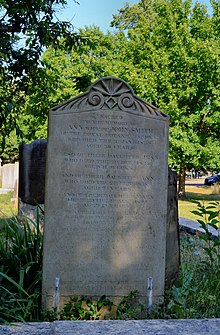John Smith (botanist)
John Smith (1798–1888) was an English botanist who was the first curator at Royal Botanic Gardens, Kew (Kew Gardens), starting in 1841. He had first been employed at the gardens as a stove boy (stoking stoves to warm the greenhouses) in 1822. Along with the directors, Sir William Jackson Hooker and Sir Joseph Hooker, he oversaw the conversion of the gardens from private royal gardens to public gardens when Queen Victoria converted them, possibly saving them from oblivion. He further prevented the gardens from catastrophic decline during the late 19th century when they were neglected in funding priorities. According to the Kew website, "It is significant that when stove-boy-Smith arrived at Kew, 40 species of fern were grown but when Curator Smith retired, there were 1,084."

John Smith | |
|---|---|
| Born | 1798 |
| Died | 1888 |
| Nationality | British |
| Scientific career | |
| Fields | Botany |
Works by John Smith
- Smith, John. Catalogue of Ferns in the Royal Gardens at Kew. HMSO, London, England. 1856. 8pp, 210x140mm, PB.
- Smith, John. Cultivated Ferns: Or a Catalogue of Exotic and indigenous Ferns Cultivated in British Gardens, with Characters of General Principal, Synonyms, etc. William Pamplin, London, England. 1857. xii,84pp, 163x103mm, HB. Also possibly an 1864 edition.
- Smith, John. Ferns: British and Foreign, Their History, Geography, Classification and Enumeration of the Species of Garden Ferns with a Treatise on Their Cultivation, etc. First edition: Robert Hardwicke, London, England. 1866. xiv,412(2)pp, 195x125mm, HB; Web: https://archive.org/details/fernsbritishfore00smitrich. Also second edition (1877) and third edition (1879), subtitled The History, Organography, Classification and Enumeration of the Species of Garden Ferns.; Web: https://archive.org/details/fernsbritish00smitrich.
- Smith, John. Historia Filicum: an exposition of the nature, number and organography of ferns, and review of the principles upon which genera are founded, and the systems of classification of the principal authors, with a new general arrangement; characters of the genera; remarks on their relationship to one another; their species; reference to authors; geographical distribution; etc., etc. MacMillan & Co., London, England. 1875. (2)/xvi/429/(5)pp, 190x120mm, HB; Web: https://archive.org/details/historiafilicume00smitrich (reprinted in 1981).